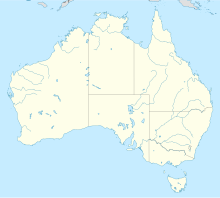Marandoo mine
| Location | |
|---|---|
| Location | Pilbara |
| State | Western Australia |
| Country | Australia |
| Coordinates | 22°38′25″S 118°07′15″E / 22.640150°S 118.120796°ECoordinates: 22°38′25″S 118°07′15″E / 22.640150°S 118.120796°E |
| Production | |
| Products | Iron ore |
| Production | 15 million tonnes/annum |
| History | |
| Opened | 1994 |
| Owner | |
| Company | Rio Tinto Iron Ore |
| Website | Rio Tinto Iron Ore website |
The Marandoo mine is an iron ore mine located in the Pilbara region of Western Australia, 45 kilometres east of Tom Price.
The mine is fully owned and operated by Rio Tinto Iron Ore and is one of twelve iron ore mines the company operates in the Pilbara. In the calendar year 2009, the combined Pilbara operations produced 202 million tonnes of iron ore, a 15 percent increase from 2008. The Pilbara operations accounted for almost 13 percent of the world's 2009 iron ore production of 1.59 billion tonnes.
The mine, alongside the rail, is within a narrow corridor that splits Karijini National Park into a northern and a southern half. The Hamersley Range, where the mine is located, contains 80 percent of all identified iron ore reserves in Australia and is one of the world's major iron ore provinces.
Rio Tinto iron ore operations in the Pilbara began in 1966. The mine itself began operations in 1994. The mine has an annual production capacity of 15 million tonnes of iron ore, sourced from open-pit operations. The ore is processed on site before being loaded onto rail.
Ore from the mine is then transported to the coast through the Hamersley & Robe River railway, where it is loaded onto ships. Ore from Marandoo, like Brockman, Mount Tom Price, Paraburdoo, Channar, Eastern Range and Yandicoogina are transported as lump and fines ore product from the mines to Dampier via rail. Before being loaded onto ships for export, the product is blended and rescreened. The maximum size for the lumps is 31.5 mm, while the fines are at a maximum of 6.3 mm.
Marandoo opened in October 1994 and was, at the time, the showpiece mine in regards to best practice design for Hamerley Iron.
The mine's workforce is on a fly-in fly-out roster, having originally been based residential, until the town became too small for the workforce. In the calendar year 2009, the mine employed 355 people, an increase in comparison to 2008, when it only employed 250.
...
Wikipedia

